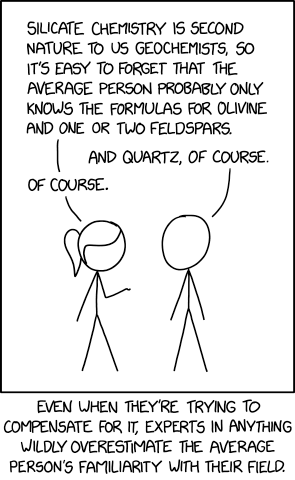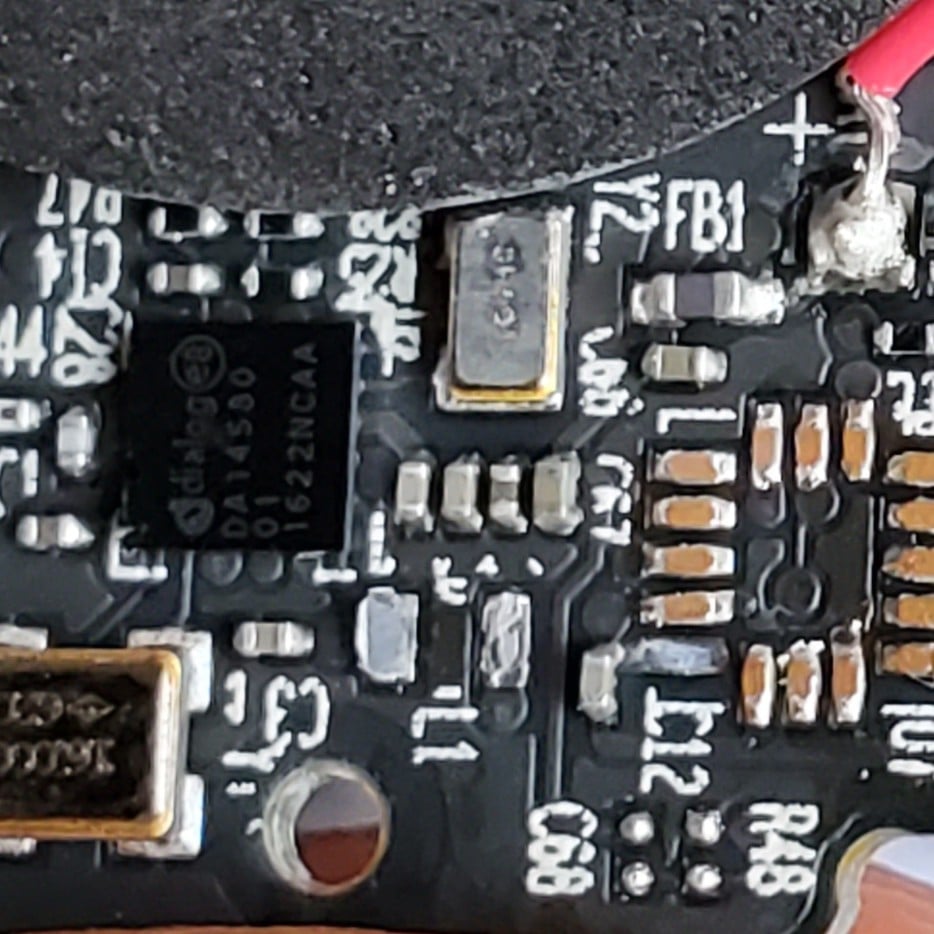Had someone contact me because a browser interface was ‘down’ and it was actually a cert issue. It surprised me that in an IT context, this person didn’t have a basic understanding of SSL certs. They didn’t even know how to add a cert exception.
It got me thinking, what basic ubiquitous things am I a dumbass about outside of IT?
Ive seen lots of ‘fun facts’ compilations, but it would be better to get a wide range of subject suggestions that I can spend 30 minutes each or less on, and become a more capable human.
Like what subjects would plumbers consider basic knowledge? Chemical interactions between cleaning products and PVC pipes?
What would an accountant or a landscaper consider to be so basic its shocking people can live their lives without knowing any of it?
For most areas of expertise, its difficult to know even what the basics are to start with.
Exactly this
Microbial pathogenesis here. This one’s a fun one for me, especially since COVID revealed just how illiterate the average person is about diseases. Here’s a couple that I think should be common sense
-
Not all bacteria cause disease. In fact, very few bacteria cause disease. Many bacteria are even helpful to us, so you should really weigh the pros and cons of taking antibiotics if you’re considering using antibiotics.
-
Antibiotics don’t work against viral infections. You’re getting all the downsides of killing helpful bacteria and getting none of the benefits
-
Do not blindly trust your immune system. Your immune system works 100% of 50% of the time. Many white blood cells take the philosophy of murdering everything in sight just to be safe. This can and often does include killing important cells in your body that just happen to be nearby the site of infection. Even if you survive the infection, you will be weakened as a result. If you can avoid getting sick in the first place, avoid getting sick.
-
Vaccines work. I don’t really know what else to say about this one.
-
Viruses and bacteria aren’t hard to kill. There’s many compounds that can kill viruses and bacteria. But humans aren’t hard to kill either. The tricky part is figuring out how to kill viruses and bacteria while also keeping the human alive. Basically: don’t drink bleach. It will kill your bacteria or virus but it’ll kill you too
-
E. coli isn’t a usually bad bacteria. Actually, it’s a very important bacteria that helps us digest food. The reason it gets such a bad reputation is because it’s relatively hard to kill, which makes them a very good way to quickly check if there’s a possible food/water contamination. In other words, the presence of E. coli itself isn’t bad, but finding E. coli does suggest that there might be other, more dangerous bacteria.
-
DO NOT EAT MOLDY FOOD. The fuzzy part that you see is just the fruiting body of the mold, analogous to a flower on a plant. The real body of the mold is an invisible network of roots that tunnel through the core of the food. Even if you cut off the fuzzy portion, you’re still eating most of the mold.
DO NOT EAT MOLDY FOOD
Fuck you, Bleu cheese 4ever!
you should really weigh the pros and cons of taking antibiotics if you’re considering using antibiotics.
Is that a choice you can make where you’re from? Here in Germany, that is entirely the physician’s choice to make. You cannot get them without a prescription. Although I guess you can ignore the doctor if they tell you to take them. But if you don’t trust your doctor, get another doctor.
Hello neighbor! I’ve had them prescribed, but when asked if it was really necessary or if I could give it a bit longer to see if my body could deal with it on its own, my doctor got a big smile and told me he could. Then he said that the dominant demographic in my area is very persistent and pushy in demanding antibiotics for the slightest thing so he’s gotten a bit too used to prescribing them.
Could you say something about why it’s bad to eat moldy food, and why it’s bad to kill the good bacteria in your body? I know your intestines can function less well, is there anything else?
Regarding moldy food, it’s because you’re taking a gamble on what exactly the mold is. There’s many types of mold, and some can produce very toxic compounds. Eating the mold can poison yourself. Of course, if you know that it’s a safe mold, then you can eat it (that’s how cheese making works). But as with all things in microbiology, things tend to be complicated very quickly, and it can be pretty hard for amateurs and even professional microbiologists to accurately distinguish between safe and unsafe molds.
With regards to killing helpful bacteria, you are correct that one of their uses is that they help improve the efficiency of digestion. This is a very young and growing field (and also not entirely in my field of expertise), so many things I say might be outdated. The second most obvious downside to killing helpful bacteria is that they prevent actual harmful bacteria from growing out of control. There are several bacteria (in particular, C. dificile) where taking antibiotics actually makes the infection worse, since the antibiotics kills off the helpful bacteria that were helping to contain the infection.
Scientists also have found semi-recently that bacteria in your intestines have an incredible amount of control over you as a person. Your body even has a sort of hotline that connects from your intestines directly to your brain, called the vagus nerve, and the bacteria in your intestines use this to communicate with your brain. For instance, scientists have found that the type of bacteria in your gut can influence the onset and severity of autism symptoms. One current hypothesis for autism is that the body, during development, somehow messes up the composition of bacteria in your intestines, and that in turn messes up the development of the brain. I seem to recall reading papers that linked bacteria to other neurological diseases and disorders, but I don’t remember completely.
Another is that the bacteria are known to be linked to obesity. Scientists have found that if you give 2 people the exact same foods in the exact same amounts, one can develop obesity and one won’t. Whether someone develops obesity or not is highly predictable based on the composition of the bacteria in their intestines. As a matter of fact, scientists have even found that if you replace an obese person’s bacteria with bacteria taken from a healthy person, then the obese person will begin to lose weight, even if that person hasn’t changed anything else.
The bacteria in your intestines are also known to be in constant communication with your immune system. I believe the immune system uses the bacteria in your intestines to train when you’re young. But this back-and-forth extends well into adulthood. Scientists found that bacteria can control the development and activity of white blood cells. That, of course, leads to differences in things like fighting off infections and killing cancers.
The bacteria in your intestines are incredibly important, and we’re only just now beginning to understand what they do for us. That’s why I say that you have to weigh pros and cons. If you think you’d be fine without it, I recommend not taking antibiotics. But if the infection is severe, then it’s worth dealing with the downsides. Talk to your doctor if you’re unsure - he probably knows more about what situations are severe and which aren’t. But what you definitely don’t want to do (which I know many people tend to do) is to pressure the doctor into prescribing antibiotics. Antibiotics aren’t a wonder drug, and people shouldn’t be immediately jumping to antibiotics as a solution to their infections
Thank you! That helped to give some more insights into why exactly it’s bad, I knew it was but not sure through which processes. My doctorate was in neuroscience, and around the time I left academia, the gut microbiome-brain axis research was really starting to ramp up. It was the big buzzword at the time. But since I left to work in the industry, I haven’t really kept up with the developments in the gut microbiome neuroscience field.
I really wish they’d find a better way to treat chronic cystitis than through antibiotics, but so far it’s the only treatment that really reliably helps.
I am not a Microbial Pathogensist, so I’ll just use the internet’s preferred method of saying something confidently that is probably wrong on some pedantic level and having actual experts climb out of the woodwork to correct me, but…
Mold isn’t a single organism, it’s actually a colony of many individual microbes that work together, most of the time; there are exceptions since the word “mold” is a lay term as much as it’s a scientific term, and the common usage doesn’t have the same rigor applied (“if it’s slimy/fuzzy, it’s mold” kinda reasoning).
The colony aspect is important, because you’re probably inhaling mold spores and eating tiny amounts of mold every day. The microbial aspect means that eating a whole colony has the potential to infect you even if your body kills off 99.9% of the microbes.
As to why an infection is dangerous depends on the type of mold. Some take up resisdence in specific organs and starve the organ cells of vital nutrients, others are carnivorous and eat your tissues/cells, others may eat beneficial bacteria or starve them of vital nutrients, some secrete toxins that are relatively harmless in small doses but deadly with a full-blown infection—penicillin is a great well-known example of this: it’s the chemical the mold uses to kill off bacteria competing for the same resources—, sometimes it’s just the immune system’s response that’s dangerous.
If you want an example of what such an infection does on our scale, look up everyone psychonaut’s favorite: Ergotism. The Ergot fungus grows primarily on cereals/grains and secretes chemicals that are psychoactive in humans (one of which is the precursor that Dr. Albert Hoffmann first derived LSD from). Unfortunately besides mind expanding insights into the nature of reality, it also comes with a nasty infection that can cause convulsions, painful burning/tingling/freezing sensations, diarrhea, vomiting, gangrene, psychosis, and more.
That all being said, if you accidentally swallow a bite of moldy bread, you probably don’t need to freak out and call poison control/EMS; just don’t regularly eat moldy food and expect to have your immune system stave off a full-blown infection for long.
why it’s bad to eat moldy food
For starters, it’s poisonous and tastes like shit.
Can you explain the E. coli point a little more?
Is it that because it’s hard to kill, it’s a good indicator of the initial contamination, meaning it’s essentially stickier than other bacteria and leaves a longer record that there was contamination?
Because otherwise being hard to kill makes it seem like it would be a bad indicator to me, in that it would return a lot of false positives (though maybe that’s the goal in this case).
With regards to food and water safety (really, this applies to all safety regulations), you would rather get false positives than false negatives. It’s better to be overly cautious than to be under-cautious. Because if we’re under-cautious, then someone might get sick. So we actually want to pick a common, hardy bacteria that’s easy to grow. There’s several other reasons why E. coli is such a good indicator bacteria, such as:
-
it grows quickly, so we can get test results quickly
-
it’s remarkably easy to distinguish E. coli from other bacteria, so much so that you don’t really even need a microscope. The less technical expertise is required for water testing, the better.
-
they’re usually safe, which lowers the amount of training required for water testers, and also lowers the risk of disease in case a test gets mishandled
-
they’re generally more resistant to water treatment than other bacteria, typically being the last to die. So if we killed E. coli, that’s a good indicator that we’ve also killed the other bacteria
-
I think false positives are preferable in that context. I’d rather have a lot of false positives than any false negatives at all when it comes to poop water
The real body of the mold is an invisible network of roots that tunnel through the core of the food. Even if you cut off the fuzzy portion, you’re still eating most of the mold.
What?!
I’ve read that on hard cheeses I can cut off the visible mold.
I’ll confess I do this with some regularity. If I unwrap a piece of cheese and see it’s moldy, well I’m not tossing a nice hunk of aged gouda in the trash! I’ll slice the mold off, then do a sniff and nibble test. If it still tastes moldy, keep slicing until it doesn’t.
I’ve done this since I was a kid, so who knows if it’s actually safe, or if I’ve just spent decades rolling the dice and getting lucky.
You can, it’s fine
Not worth the risk, to be honest. You don’t know how deep the mold has penetrated into the cheese, and without a microscope, you will never know if you’ve shaved off enough to fully remove the mold.
Also, mold spores are all over the place. They float around in the air. You breathe them in all the time. If you got visible mold growing on a cheese, there’s a good chance that there’s not-yet-visible mold growing in other spots, too.
- Viruses and bacteria aren’t hard to kill. There’s many compounds that can kill viruses and bacteria. But humans aren’t hard to kill either. The tricky part is figuring out how to kill viruses and bacteria while also keeping the human alive.
Relevant XKCD: https://xkcd.com/1217/
-
Basic computer competency starts with reading the error message.
I’ve worked in IT and you’d be amazed how many people are stuck with some problem that would be fixed if they just read the error message on their screen.
For example, it might say:
Error! The green button needs to be pressed. It’s on your keyboard. It’s green. It also has lettering on it that says PRESS HERE.
People will bring their computer in, at a total loss for what to do.
The customer service manager sent not one, not two, but three emails in one hour demanding our engineers fix this login error that a high valued customer had.
The error was “username or password was incorrect”.
I fixed it by resetting their password.
What we need really is a skills tree for real life. Then it would be much easier to spot the things you’re level 1 in.
I work in IT and I need this. This field is vast and sometimes it’s hard to know what you don’t know, or how well you know what you know.
Sure, there’s certs, but they just show how well you’re familiar with that particular field (or worse yet, that you know how to pass that particular test).
I work in IT and I need this.
Don’t use high heat on nonstick pans.
Assuming we want the same internal temperature, high heat will cook the outside more than low heat. For bread you probably want a bit more heat to get a nice crusty outside. For steaks you want less heat to avoid overcooking most of the meat, then just a quick sear on the outside.
Don’t overload your pan. If your food is cooking in a bunch of water that came out of the food you are boiling it, not frying it, and it’s going to suck. Put in less food so that water can boil off before it starts boiling your food.
Don’t overload your cookie sheets either. The center of the pan will not get as hot due to all that cold wet food sucking up all the heat, so the fries on the edge will cook faster than the fries in the middle.
Sear or roast your brassicas. They taste way better with some browning and lots of oil and salt.
Measuring food by weight is much easier and much more accurate than measuring by volume with measuring cups and spoons. This is next level awesome if you’re trying to measure something sticky like honey or peanut butter, you can weigh it in the mixing bowl rather than dirtying a measurement device.
Don’t overvook your meat. Use a fast read meat thermometer. Beef, pork, chicken, seafood, are all much better when cooked.to the proper internal temperature.
I am not a cooking expert, I am a heat transfer expert with a strong background in chemistry and those skills transfer over to cooking.
I find high heat in stainless steel pans is very good though? Like it works better to heat the pan and then add your oils. They’re so much better.
Definitely. I agree that in stainless, it is best to get hot first, then add oil, then add food. It is also best to let the food sit still for a bit on the heat, as it browns it will naturally start to detach to flip or remove. Same works for cast iron but easier
Processes
Super generic, most people interact with them in some form all the time both at work and personal without a second thought. Very few understand what makes a good process, especially when there is a handoff involved.
Oh also communication. Everyone does it so a lot of people must be really good at it right? Yeah…
Good one, thanks!
If you’re pulling on a rope really hard, don’t wrap it around your hand to get a better grip. If it starts to pull away from you, you won’t be able to let go, and if someone runs up to help and starts hauling on the end, your hand is going to be in a world of pain.
What if there’s no reason for it to pull away?
don’t wrap it around your hand to get a better grip
I’m listening…
deleted by creator
Don’t brake in curves, whether you have a car or bike. Especially in slippery conditions.
More fun fact than subject…will file this one under ‘safe vehicle handling’
Oh most people can’t drive. Recently read an article 90% of drivers overestimate themselves. I know I’m above average but by far not a good driver. I still try to become better.
For sure. I’ve done several high level driving courses for work. TL;Dr drive slower, increase follow distance. You may arrive 30 seconds late but it would eliminate the chance of so many accidents. Learning to ride a motorbike made my driving way better too.
You may arrive 30 seconds late
I’d even doubt that. If you take an average and factor in that you might at one time have a crash due to your shitty driving, you’ll always arrive infinitely faster.
Learning to ride a motorbike made my driving way better too.
Oh there’s a good video I’d recommend about cornering on a bike: you’re leaning the wrong way by F9
Way ahead of you haha F9 is awesome!
Here is an alternative Piped link(s):
you’re leaning the wrong way by F9
Piped is a privacy-respecting open-source alternative frontend to YouTube.
I’m open-source; check me out at GitHub.
I know this yet I still do it. I guess this should be preceeded by “gauge your entry speed”.
If people say ‘i have excel competence’, the difference could be between ‘i can resize fonts and do tables for my company forms because I don’t know how to do them in word’ to ‘fully modelling a business plan for a Telco, including it’s subsidiary units’. Make sure you test for the level of competence you’re after.
Learn a new formula every now and then, or at very least learn to read other people’s formulas, then google what you don’t know. Literacy in any field is the result of a long process of learning.
(Reread your question) Outside of IT: if an appliance stops working, it’s sometimes just a fuse that needs replacing. It’s cheap and easy to do.
‘Basic appliance troubleshooting and repairs’
Thanks !
If someone tells me they’ve mastered excel, they’re either overqualified for any job I’ll ever hire them for (I’m not in IT) or lying.
Using pivot tables will make people think you’re a wizard.
Recently been picking up some basic PowerQuery and my goodness is it a game changer
How to do basic DIY. Do you know all the functions of your drill? Can you screw something in to wood, brick, plaster - for dab and cavity? What fixings and screw types should you use? Can you re-wire a plug? Change a tap? Wire an Ethernet connector and punchdown? Balance your books, calculate your tax, basic car maintenance…?
As a software engineer or IT person it’s easy to think we’re all so very smart, but anyone skilled in ANYTHING will know so much you don’t in their own subject.
Basically everyone is an idiot about most things.
Or, phrasing it a bit more nicely, people nowadays have pretty specialized knowledge.
Weirdly enough I’m an IT guy and can do all of those things, some of them only in a basic way which is why I leave taxes and car maintenance to the professionals.
50/50 on those things… Thanks, there are a few things in the list I can improve on.
When you understand that in the grand scheme of things we are all profoundly ignorant, everything becomes much more interesting.
Anytime I think " fuck I don’t know how to do that" I remind myself that I can learn it, and then learn at least the basics.
While I may not be the font of all knowledge, I am the overflowing urinal of useless information.
Point the knife away from you when cutting
deleted by creator
And definitely don’t lick it menacingly like a pirate.
I work at a bakery. The number of people who ask for half a loaf of bread (normal to buy in this area, but they’re not pre-cut), then get upset when I pick up a whole loaf so I can cut half off is mind blowing to me. I’m also not a native speaker and autistic, so I’m wary of being inadvertently way too rude if I comment on it.
People are fucking idiots lmao. What, you don’t bake your half loaves, with the crust missing on the flat side?
People this stupid are allowed outside on their own? Wtf did they expect?
I… Huh!? What do they want?
They want a loaf baked as a half loaf in the first place. They don’t realize all the half loaves are full loaves cut after baking.
They don’t realize that baking is a process that can only produce full loaves.
As someone who works with tech, here is my 2 cents on basic knowledge.
If your computer is “not working” restarting the computer can generally fix 80 percent of the issues. We are not trying to make you mad, this is literraly first thing I am doing if you present me a problem.
Stop downloading things from unknown sources.
Use generic effects/fonts on your powerpoint. Just because you bought something cool doesnt mean it will magically transfer when you pass your presnetation to another computer for your presentation. (Microsoft does not migrate your paid effects)
For gamers Stop playing pvp on your pc/console on wifi, are you a mad?
Everyone in general We are at an age of computers. Learn how to type, it will save you tremendous amount of time, literally.
Do… do people really buy add-ons for pp to enhance their slide decks?
Yes, i have seen it happen several times and i get blamed why its not showing on the show laptop. The moment i ask, “did you purchase any add on effects?” i feel like a customer service telling a customer your credit card was denied.
That’s just wild. I’m in meetings with slides constantly and never heard of this. We’ll, now I have a new rabbit hole to go down (as in “finding the most ridiculous of these”).
It definitely makes you laugh once you see it.
FYI you can embed some Truetype fonts in PowerPoint and word (not on mac)














